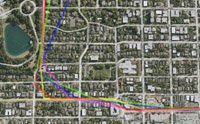Building a Transportation Information System Using Only GPS and Basic SMS Infrastructure
 A bus depot in Bishkek, Kyrgyzstan with marshrutkas and car taxis.
A bus depot in Bishkek, Kyrgyzstan with marshrutkas and car taxis.
Abstract
This work consists of two main components: (a) a longitudinal ethnographic study in Kyrgyzstan that demonstrates the importance of transportation resources in the developing world and how to plan for an appropriate ICT solution, and (b) the results of a proof-of-concept system engineered to create a bottom-up, transportation information infrastructure using only GPS and SMS. Transportation is a very important shared resource; enabling efficient and effective use of such resources aids overall development goals.
The system, *bus, involved the development of a hardware device (a *box) containing a GSM modem and a GPS unit, that can be installed on a vehicle and used to track its location. The *box communicates via SMS with a server connected to a basic GSM phone. The server runs route a prediction algorithm and users can send SMS messages to the server to find when a bus will arrive at their location.
The paper discusses the system and early testing, as well as the development implications for a range of urban and rural environments where transportation is scarce or inefficient, and where a central authority or institution is not in a position to provide robust information resources for users. We describe how the solution is also situated within technology usage patterns common to the developing world.





